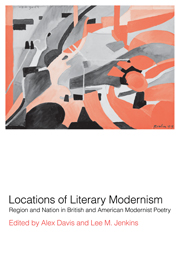Book contents
- Frontmatter
- Contents
- Notes on contributors
- Preface
- INTRODUCTION
- PART ONE OBSTINATE ISLES: THE ANGLO-CELTIC ARCHIPELAGO
- PART TWO AN AMERICAN PLACE
- 7 Pound's places
- 8 Wallace Stevens and America
- 9 Locating the lyric: Marianne Moore, Elizabeth Bishop and the Second World War
- 10 ‘In the published city’: the New York School of Poets
- 11 Modernism deferred: Langston Hughes, Harlem and jazz montage
- Notes
- Index
8 - Wallace Stevens and America
Published online by Cambridge University Press: 06 July 2010
- Frontmatter
- Contents
- Notes on contributors
- Preface
- INTRODUCTION
- PART ONE OBSTINATE ISLES: THE ANGLO-CELTIC ARCHIPELAGO
- PART TWO AN AMERICAN PLACE
- 7 Pound's places
- 8 Wallace Stevens and America
- 9 Locating the lyric: Marianne Moore, Elizabeth Bishop and the Second World War
- 10 ‘In the published city’: the New York School of Poets
- 11 Modernism deferred: Langston Hughes, Harlem and jazz montage
- Notes
- Index
Summary
In the Prologue to his Kora in Hell: Improvisations, William Carlos Williams intimates a kinship of sorts with Wallace Stevens as the other American modernist poet who ‘stayed at home’ and chose not to ‘run to London’ as Pound and Eliot had done. Yet, in terms of an American locale as a poetic, Stevens and Williams more often emerge as sparring partners than as partners. Stevens' poem of 1945, ‘Description without Place’, where ‘the theory of description matters most’ and where ‘It is a world of words to the end of it, / In which nothing solid is its solid self’ was greeted with indignation by Williams, who had argued as early as 1921 that ‘If Americans are to be blessed with important work it will be through intelligent, informed contact with the locality which alone can infuse it with reality’, and who had gone on to argue in 1925 in his In the American Grain that America has seldom been realised as a place, but more often as an ideal or myth, as a description without, or independent of, place.
- Type
- Chapter
- Information
- Locations of Literary ModernismRegion and Nation in British and American Modernist Poetry, pp. 178 - 198Publisher: Cambridge University PressPrint publication year: 2000
- 1
- Cited by

